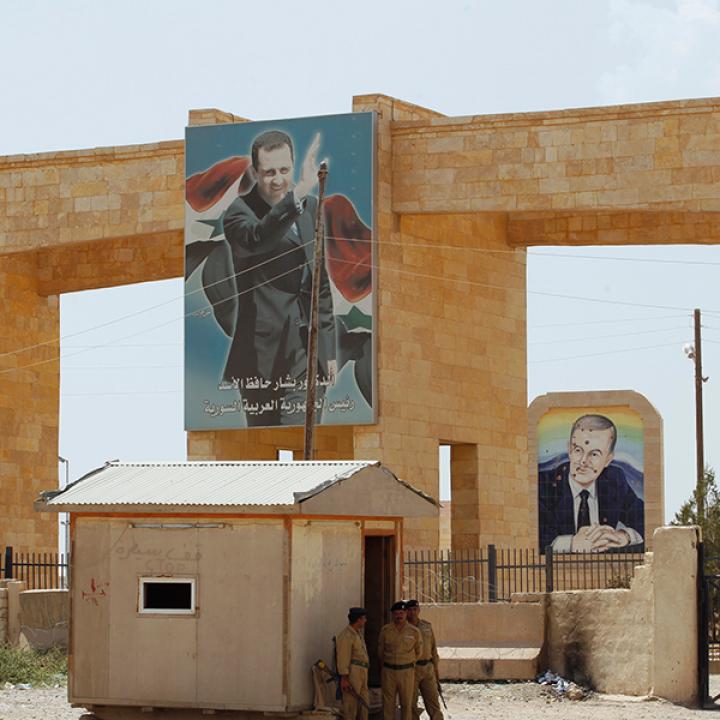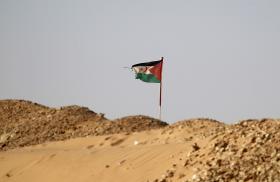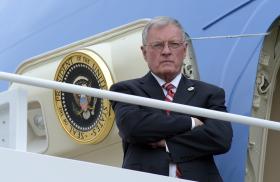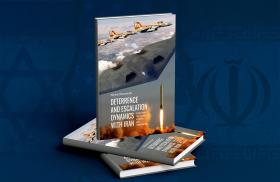
- Policy Analysis
- Fikra Forum
Prospects for Iraq-Syria Security Cooperation in a Post-Assad World

Islamic State threats in the border region necessitate shared efforts between Baghdad and Syria’s new leadership as coalition forces withdraw, but Iraq’s November 11 election and internal divisions over engaging with Damascus are blocking progress.
Discussions are now taking place about the need to strengthen Iraq-Syria security cooperation after the downfall of the Assad regime. These discussions are being driven by shared challenges, chief among them the fight against the Islamic State (IS). Despite its territorial losses, IS continues to pose a serious threat, particularly in the desert regions spanning both countries. This threat is prompting Baghdad and Damascus to consider joint security strategies, especially as the international coalition’s role in Iraq diminishes.
This potential rapprochement faces several hurdles, including divisions within Iraq about the legitimacy of engaging with the Syrian regime, as well as complex and overlapping regional dynamics that could obstruct any serious efforts to build lasting security cooperation.
Security Threats
Tensions along the Iraq-Syria border have persisted since 2003, when the area became a corridor for militants and weapons. This situation worsened with the outbreak of the Syrian revolution in 2011, as foreign fighters and extremist groups began to move freely across the border into Syria.
After the Syrian opposition took power in 2024, Iraqi member of parliament Mokhtar al-Moussawi revealed that Iraqi officials had secretly visited Damascus to discuss shared security threats. These meetings paved the way for a series of visits by Iraqi intelligence chief Hamid al-Shatri to Damascus, where he met Syrian President Ahmed al-Sharaa in February, April, and August. Iraqi Prime Minister Mohammed Shia al-Sudani also met with Sharaa in the Qatari capital, Doha, as part of a Qatar-brokered initiative to enhance cooperation between Baghdad and Damascus.
These meetings reflect a mutual recognition of the importance of security cooperation to ensure internal stability. Baghdad fears that the security vacuum left by the fall of the Assad regime could be exploited, particularly by thousands of IS fighters and their families currently housed in the al-Hol camp in northeast Syria. Iraqi officials stress the need for direct coordination with Damascus and intensified counterterrorism efforts to contain the threat and build trust between the two nations.
Baghdad is also eager to collaborate on monitoring the vast desert areas that have become a key corridor for drug and arms smuggling between the two countries. Large quantities of narcotic pills and light weapons are reportedly being trafficked between Syria’s Deir al-Zour and Iraq’s Anbar province.
Damascus, on the other hand, is wary, fearing that any security agreement with Baghdad could lead Iraqi militias to gain renewed influence inside Syria through the support of Syrian Shia groups in the coastal region. Starting in 2013, Iraqi factions, chief among them Kataib Hezbollah and Harakat al-Nujaba, fought alongside the Assad regime under the pretext of protecting religious shrines. In coordination with Iran’s IRGC Qods Force, they helped expand Iranian influence in areas like Deir al-Zour, Abu Kamal, and al-Qusayr as part of securing the Shia Crescent, a land corridor stretching from Tehran to Beirut via Baghdad and Damascus.
International Coalition’s Withdrawal and Options for Cooperation
The imminent withdrawal of international coalition forces from Iraq, including U.S. troops, marks a significant turning point and raises a critical question: Can Iraq confront cross-border terrorist threats without the aerial cover and intelligence support the coalition has provided since 2014 along the 600-kilometer Iraq-Syria border?
The answer is that it will be difficult. IS still poses a major threat in the desert regions of Anbar and Nineveh. As a result, cooperation with Damascus is no longer a diplomatic or political option, but has become a security necessity to preempt terrorist attacks.
The coalition’s departure also presents Iraq with an opportunity to redefine its regional alliances. In the absence of a direct Western presence, engagement with the new Syrian leadership could offer Baghdad a way out of its current geopolitical isolation, especially if it manages to strike a balance between the region’s competing power blocs.
Some Iraqi political factions view the coalition’s exit as a chance to rebuild a Baghdad-Damascus regional security framework free from foreign dictates. Yet however appealing this vision may be, it faces substantial challenges, chief among them the deep-rooted mistrust between the two countries’ security institutions, diverging priorities, and conflicting regional alliances.
Regional Drivers
Iraq-Syria security cooperation cannot be understood in isolation from the regional powers that actively shape the relationship, either by supporting or obstructing it. Turkey, for instance, is closely monitoring Iraq-Syria coordination, fearing it could pave the way for Iran to regain influence in Syria. Ankara is also concerned that Iraq-Syria rapprochement could lead to reactivation of the Kirkuk-Baniyas oil pipeline, which has been shut down since 2003, and that this would threaten the Kirkuk-Ceyhan pipeline, in which Turkey has significant economic and strategic interests.
In fact, Syria and Iraq have recently begun talks in Baghdad about reviving the Kirkuk-Baniyas pipeline, which Iraq views as a strategic alternative to the Kirkuk-Ceyhan pipeline—for exporting oil, reducing dependence on the Arabian Gulf and Turkey, and increasing its economic leverage. The idea gained traction after the March 2023 shutdown of the Kirkuk-Ceyhan line—which is, however, now back in use.
There are multiple challenges in restarting the Baniyas line, principally relating to infrastructure, which has deteriorated and will require massive investment. Additionally, the pipeline will pass through areas controlled by the Syrian Democratic Forces in Deir al-Zour as well as zones under the influence of Shia militias in Syria’s coastal region, necessitating security agreements to ensure its safety.
As for Turkey, this situation has heightened its concerns. Ankara fears that the SDF, which it views as a terrorist organization, could use the project to strengthen its presence in northeast Syria. Consequently, Ankara has been actively working through political allies in Iraq and Syria to prevent a security or economic rapprochement.
Gulf states, which often present themselves as neutral actors, share Turkey’s concern about a resurgence of Iranian influence in Damascus via Baghdad. Qatar has been offering energy alternatives to Syria to reduce its reliance on Iraqi oil. Meanwhile, Saudi Arabia and the United Arab Emirates are attempting to pull Syria toward a distinct Arab axis, independent of Tehran. For Turkey and the Gulf states, cooperation between Baghdad and Damascus is politically sensitive unless it comes with guarantees that Iran will not play a central role.
The United States has shown limited interest in the Iraq-Syria security situation. Some reports indicate that Washington is quietly encouraging normalization between the two sides, particularly in counterterrorism and border control, to curb Iranian influence in Iraq. Nevertheless, Washington remains wary about any arrangements that could strengthen Iran’s foothold in Syria.
Iran, still reeling from the loss of strategic ground in Syria and the collapse of its influence cultivated since 2011, is now seeking to reposition itself. One avenue is promoting a trilateral coordination mechanism between Tehran, Baghdad, and Damascus on the pretext of combating cross-border terrorism. Through this approach, Iran hopes to reestablish the land corridor connecting Tehran to Beirut, an integral part of the Shia Crescent. Several Iranian officials have made public statements stressing the need to consider the regional balance of power in any new security arrangements, an implicit call not to marginalize Iran’s role in Syria. Multiple sources suggest that Tehran is leveraging its political influence in Baghdad to secure a role in any future cooperation with Damascus.
Baghdad-Damascus Cooperation and Internal Divisions
The fall of the Assad regime in late 2024 was far from a purely domestic event; it marked a major turning point in regional power dynamics. Iran still views Syria as a gateway for its influence in the Levant and a key link in the so-called axis of resistance. On the other hand, Arab and Western powers, led by the United States and the Gulf states, are determined to prevent the resurgence of Iranian influence in post-Assad Syria.
This regional tug-of-war has spilled over into Iraq’s internal political scene. Instead of making decisions about cooperation with Damascus based on national interest, Baghdad once again finds itself a battleground for competing regional axes and foreign loyalties.
The Iraqi political landscape is currently split into two main camps. The first is closely aligned with Iran and considers engagement with the new Syria a betrayal of the Assad regime, a longtime strategic ally supported by Tehran. This bloc sees any outreach to the new Syrian leadership as legitimizing a Western-Gulf project imposed in the aftermath of Assad’s fall, and as Iraqi submission to foreign pressure aimed at distancing it from Iran.
The opposing camp advocates pragmatic engagement with Damascus based on Iraq’s security interests. This group argues that Syria’s stability is essential to Iraq’s security and that severing ties would create a border vacuum that could enable an IS resurgence or harm Iraq’s economy.
Ironically, while the pro-Iran camp accuses its rivals of yielding to Western dictates, it refuses to acknowledge its own alignment with Tehran’s agenda. An example of this tension emerged when former Prime Minister Nouri al-Maliki rejected the idea of inviting Syria’s president to attend the Arab League Summit held in Baghdad in May. Maliki argued that the Iraqi government “should not host individuals suspected of spilling Iraqi blood,” describing President Ahmed al-Sharaa as someone wanted by Iraqi courts on terrorism charges and for support of armed groups.
Maliki’s statements carried multiple political messages. Domestically, he was signaling that Sharaa is unwelcome, and externally he was making it clear that his political faction will not tolerate normalized relations with any entity that lacks Tehran’s approval.
His position drew notable criticism. Iraqi politician Izzat al-Shabandar stated that Sharaa has denied the accusations and challenged those with evidence to present it in court rather than making unsubstantiated allegations. Meanwhile, parliament member Shaalan al-Karim asserted that there is no arrest warrant for Sharaa from either Iraqi courts or Interpol, accusing Maliki of “dragging the judiciary into a political game” that does not serve Iraq’s national interest.
In contrast, Prime Minister Sudani underscored the importance of Syria’s participation in the Baghdad-hosted Arab League Summit, stating that Sharaa’s presence was vital to presenting a vision for the new Syria. He emphasized that most Arab countries are now eager to move beyond the Syrian crisis.
Future Scenarios
There are several possible scenarios for future Iraq-Syria ties. The first depends on Baghdad’s ability to overcome regional pressures and internal divisions. If it is successful, this could pave the way for expanding the Baghdad-Damascus partnership, including establishing joint border coordination centers, security campaigns against IS, rehabilitation of the Kirkuk-Baniyas pipeline, and other economic projects. However, this would require a strong and politically cohesive Iraqi umbrella able to balance international relationships.
Given regional complexities, the second and more likely short-term scenario involves continued limited security cooperation, including intelligence sharing and covert field operations that fall short of formal partnership or full normalization. If relations sour, there could be a return to the border crises characterizing the period before 2014, with the attendant security chaos and economic threats.


